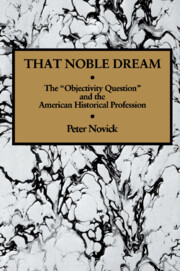Book contents
- Frontmatter
- Contents
- Preface
- Introduction: Nailing jelly to the wall
- I Objectivity enthroned
- II Objectivity besieged
- III Objectivity reconstructed
- IV Objectivity in crisis
- 13 The collapse of comity
- 14 Every group its own historian
- 15 The center does not hold
- 16 There was no king in Israel
- Appendix: Manuscript collections cited
- Index
14 - Every group its own historian
Published online by Cambridge University Press: 29 March 2011
- Frontmatter
- Contents
- Preface
- Introduction: Nailing jelly to the wall
- I Objectivity enthroned
- II Objectivity besieged
- III Objectivity reconstructed
- IV Objectivity in crisis
- 13 The collapse of comity
- 14 Every group its own historian
- 15 The center does not hold
- 16 There was no king in Israel
- Appendix: Manuscript collections cited
- Index
Summary
Over the last hundred years no component of the synthesis of ideas which went to make up the norm of historical objectivity had been more central and enduring than “universalism.” Truth was one, the same for all peoples. It was, in principle, accessible to all and addressed to all. Particularist commitments—national, regional, ethnic, religious, ideological—were seen as the enemies of objective truth. They had to be transcended if unitary truth was to be approached. Ranke's commanding reputation rested in large part on the perception that he had risen above narrow nationalism and parochialism. American historians had taken from Francis Bacon not only their notions of the inductive method, but also his warnings against the “Idols of the Cave”: particularistic commitments which blocked access to universal truth. Historians were attracted to those schools of social science which believed that empathic identification and Verstehen were legitimate methods of comprehension, but insisted, along with the social scientists, that these devices were available to all investigators, and were not the special prerogative of insiders. The close connection which historians saw between detachment and objectivity made them sympathetic to Mannheim's celebration of the vantage point of free-floating and socially detached observers, whose liberation from particularist loyalties allowed them to approach closer to objectivity.
Information
- Type
- Chapter
- Information
- That Noble DreamThe 'Objectivity Question' and the American Historical Profession, pp. 469 - 521Publisher: Cambridge University PressPrint publication year: 1988
Accessibility standard: Unknown
- 1
- Cited by
